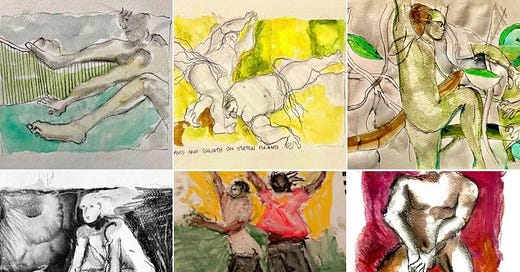All my drawings can be found on Instagram @klonskyart
President Biden will allow millions of federal student loan borrowers to freeze their payments until August 31, the latest extension of a pandemic relief measure that began more than two years ago.
It will be the seventh time student debt repayment has been delayed since early in the pandemic.
Americans owe $1.6 trillion on federal student loans — more than they owe on car loans, credit cards or any consumer debt other than mortgages.
Growing up in California in the sixties where the system of public higher education was essentially free to every California high school graduate causes me to constantly scratch my head as to why free higher eduction is not considered a basic right.
It was Governor Ronald Reagan who ended free higher ed in California which should tell you everything you need to know.
There has been a lot of debate over the past couple of years about what tools to use to admit students to one college or university or another.
Many universities have ended the use of SATs and even admission entries are being criticized as discriminatory, favoring the economically advantaged over working class students and students of color more generally.
Some argue that these admission tools need to be reformed.
But whether it is a test or an essay, the purpose of all these tools is not to admit, but who to exclude from certain colleges and universities.
The same is true for college costs and college debt.
Reports are that Biden, who during the campaign opposed broad student debt forgiveness, may be changing his mind.
President Biden is more open to enacting widespread student loan forgiveness than he has ever been before, a top Democratic senator told student loan borrower activists at a virtual summit today.
There was an interesting letter to The Wall Street Journal the other day.
As President Biden delays the collection of federal student loans, we need to consider the effect that loan forgiveness and federally subsidized college might have on the U.S. military (“Student Debt Freeze Gets a New Extension,” U.S. News, April 7). When I worked at Navy boot camp, an overwhelming majority of recruits listed paying for college as their primary motivator for joining the Navy. If young Americans can access free college without having to earn the GI Bill or sign up for follow-on military service, will they volunteer for the armed forces in adequate numbers?
Eric Leis
South Bend, Ind.
The idea that student debt and expanded public higher education funding would impact military recruitment had gone right by me.
So, thank you Eric Leis and South Bend for pointing it out.
Would student debt forgiveness mean less poor and working class young folks would not have to turn to the military for a job?
It would be an added bonus.






When they ended the draft I saw the handwriting on the wall. Enlistment would be the employer of last resort and so it is. You don't have to have a draft if you have high unemployment and the training you get won't get you a job. Army electronics training can't get you a job as a TV repairman (when they had them).
Peace Corps offers similar terms, i.e. loan deferment and cancellation. In my day, only deferment was available. So I did work-study (cleaned toilets, made pizza) and took the loans, then deferred them for 15 years (had a grad school deferment as well) until inflation chewed it down to almost nothing. Nowadays my alma mater doesn’t do loans, only work study and grants.